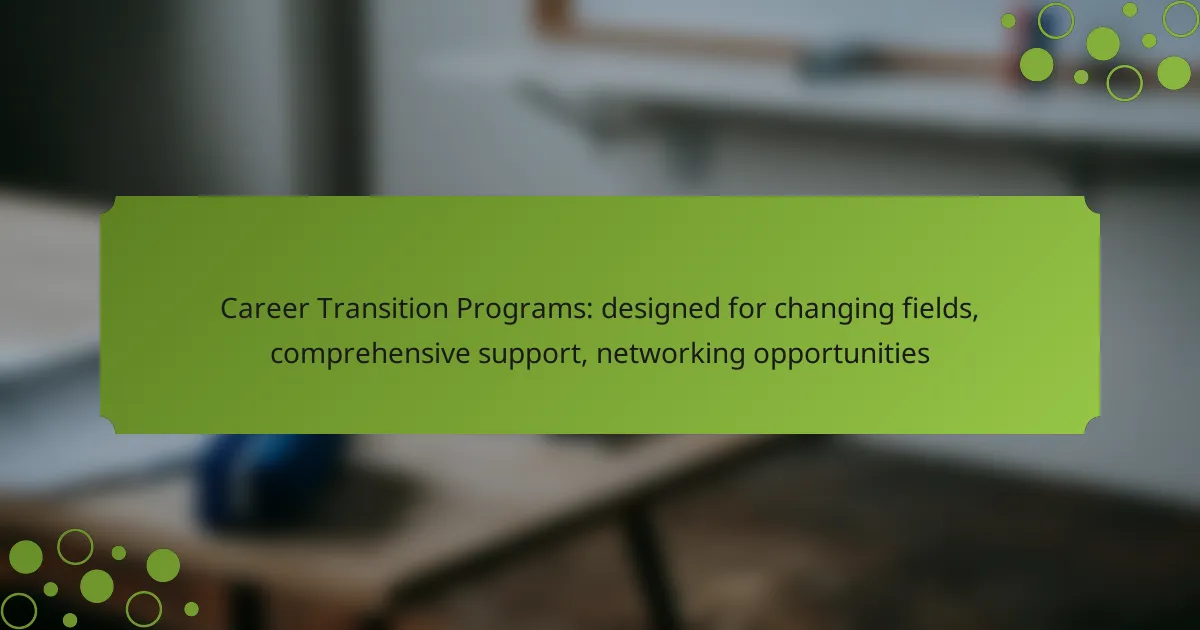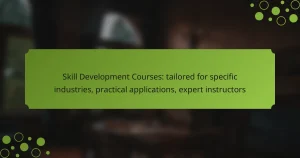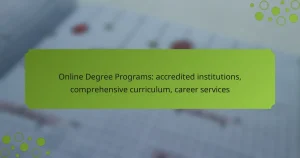
Career transition programs are specifically designed to support individuals seeking to change fields by offering comprehensive resources and training. These programs provide hands-on learning, mentorship, and valuable networking opportunities, ensuring participants are well-equipped for a successful shift into new industries.

What are the best career transition programs in the US?
The best career transition programs in the US provide structured training and support for individuals looking to change fields. These programs often include hands-on learning, mentorship, and networking opportunities to facilitate a successful transition into a new career.
General Assembly’s Software Engineering Immersive
General Assembly’s Software Engineering Immersive is a full-time, intensive program designed for those looking to enter the tech industry as software developers. Over approximately 12 weeks, students engage in hands-on projects, learning programming languages such as JavaScript and Python, along with frameworks like React.
Participants benefit from a collaborative learning environment and access to career services, including resume workshops and interview preparation. Graduates often find roles in various tech companies, with many securing positions within a few months of completing the program.
CareerFoundry’s UX Design Program
CareerFoundry’s UX Design Program is tailored for individuals aiming to become user experience designers. This program spans about six months and is conducted entirely online, allowing for flexibility while maintaining a structured curriculum that covers user research, wireframing, and prototyping.
Students receive personalized mentorship from industry professionals and complete real-world projects to build their portfolios. The program emphasizes networking opportunities, connecting graduates with potential employers and industry events, which can significantly enhance job prospects.
Springboard’s Data Science Career Track
Springboard’s Data Science Career Track is designed for those interested in pursuing a career in data science. This self-paced program typically takes around six months to complete and covers essential topics such as data analysis, machine learning, and statistical modeling.
Students benefit from one-on-one mentorship and a job guarantee, meaning that if graduates do not secure a job within a specified period, they receive a refund. The program also includes hands-on projects that allow learners to apply their skills to real-world data sets, making them more attractive to employers in the data-driven job market.

How do career transition programs support changing fields?
Career transition programs provide essential support for individuals looking to change fields by offering tailored resources, skills training, and networking opportunities. These programs are designed to facilitate a smooth shift into new industries, ensuring participants have the tools and connections needed for success.
Personalized coaching and mentorship
Personalized coaching and mentorship are key components of career transition programs. Participants often work one-on-one with experienced coaches who guide them through the process of identifying transferable skills and setting achievable career goals. Mentors from the target industry can provide insights and advice that are invaluable for navigating the new field.
When selecting a program, consider the availability of personalized coaching. Look for programs that offer regular check-ins and tailored advice, as this can significantly enhance your transition experience. Be proactive in seeking feedback and utilizing your mentor’s network for introductions and opportunities.
Hands-on projects and real-world experience
Hands-on projects and real-world experience are crucial for building confidence and competence in a new field. Many career transition programs incorporate practical assignments or internships that allow participants to apply their newly acquired skills in real-world settings. This experiential learning helps bridge the gap between theory and practice.
When evaluating programs, check if they include opportunities for hands-on projects. Engaging in real-world tasks not only strengthens your resume but also helps you build a portfolio that showcases your abilities to potential employers. Aim for programs that partner with local businesses or organizations to provide relevant project experience.

What networking opportunities do career transition programs offer?
Career transition programs provide a variety of networking opportunities that are essential for individuals looking to change fields. These programs often facilitate connections with industry professionals, peers, and mentors, helping participants to build valuable relationships that can lead to job opportunities and career growth.
Access to industry events and workshops
Career transition programs frequently include access to industry-specific events and workshops, which are crucial for networking. These events allow participants to meet professionals in their desired field, learn about current trends, and gain insights from experienced speakers.
Attending workshops can also enhance skills relevant to the new career path, making participants more attractive to potential employers. Look for programs that offer regular events, as consistent engagement can significantly expand your professional network.
Alumni networks and community forums
Many career transition programs boast strong alumni networks and community forums that serve as ongoing support systems. These networks often provide a platform for sharing job leads, advice, and experiences, which can be invaluable during a career change.
Engaging with alumni can also lead to mentorship opportunities, where seasoned professionals offer guidance tailored to your specific career goals. Actively participating in these forums can help you stay informed about job openings and industry developments, enhancing your chances of success in your new field.

What are the prerequisites for enrolling in career transition programs?
Prerequisites for enrolling in career transition programs typically include a high school diploma or equivalent, along with a willingness to learn new skills. Some programs may also require basic knowledge or experience in the field you wish to enter, particularly for technical roles.
Basic technical skills for tech programs
For those interested in tech programs, having foundational technical skills is crucial. This may include familiarity with computer systems, basic programming knowledge, or understanding of software applications. Many programs recommend a basic proficiency in tools like Microsoft Office or Google Workspace.
Additionally, aspiring tech professionals should consider learning programming languages such as Python or JavaScript, as these are commonly used in various tech roles. Online resources and community colleges often offer introductory courses to help build these skills.
Assessment tests for program suitability
Many career transition programs utilize assessment tests to determine a candidate’s suitability for the course. These tests often evaluate skills such as problem-solving, logical reasoning, and technical aptitude. Understanding your strengths and weaknesses can help you choose the right program.
Before enrolling, take advantage of practice assessments available online. These can provide insight into what to expect and help you identify areas that may need improvement. Some programs may also offer pre-enrollment workshops to better prepare candidates for the assessments.

How to choose the right career transition program?
Choosing the right career transition program involves assessing your specific needs and the program’s offerings. Look for programs that provide comprehensive support, networking opportunities, and a strong reputation in your desired field.
Consider program reputation and reviews
Start by researching the program’s reputation within the industry you wish to enter. Look for testimonials from past participants and check online reviews on platforms like Google or specialized forums. A program with a solid track record can significantly enhance your chances of success.
Additionally, consider the program’s connections with employers and industry leaders. Programs that have established partnerships often provide better job placement opportunities and networking events, which can be crucial for your career transition.
Evaluate curriculum and support services
Examine the curriculum to ensure it aligns with your career goals. A well-rounded program should cover essential skills and knowledge relevant to your new field. Look for courses that offer hands-on experience, as practical application can be more beneficial than theoretical learning alone.
Support services are equally important. Check if the program offers career coaching, resume workshops, or interview preparation. These resources can help you navigate the job market more effectively. Programs that provide ongoing support even after completion can be particularly valuable as you make your transition.

What are the costs associated with career transition programs?
Career transition programs can vary significantly in cost, depending on the type of program, duration, and delivery method. Generally, participants should expect to pay for tuition, materials, and potentially additional fees for certifications or networking events.
Tuition fees for online courses
Tuition fees for online courses in career transition programs typically range from a few hundred to several thousand dollars. For example, short courses may cost around $200 to $1,000, while comprehensive programs can be priced between $1,500 and $5,000. It’s essential to evaluate what each program offers to ensure it aligns with your career goals.
When considering tuition fees, factor in the potential return on investment. A higher upfront cost may lead to better job placement rates or higher salaries post-completion, making it worthwhile in the long run.
Financial aid and scholarship options
Many career transition programs offer financial aid and scholarship options to help offset costs. These can include federal grants, private scholarships, or employer-sponsored funding. Researching available options early in the application process can significantly reduce your financial burden.
To maximize your chances of receiving aid, prepare a strong application that highlights your career goals and financial need. Additionally, check if the program has partnerships with organizations that provide scholarships specifically for career changers.

What proof exists of success from career transition programs?
Career transition programs have demonstrated success through various metrics, including improved employment rates and positive personal outcomes for participants. These programs often provide essential resources and support that facilitate smoother shifts into new fields.
Graduate employment rates
Many career transition programs report graduate employment rates that range from 70% to 90% within six months of completion. These rates reflect the effectiveness of tailored training and networking opportunities provided to participants. Programs that include internships or hands-on experiences tend to see even higher employment outcomes.
It’s crucial to consider the job market in your desired field when evaluating these rates. Industries such as technology and healthcare often have higher demand, leading to better employment prospects for graduates from relevant transition programs.
Case studies of successful transitions
Numerous case studies illustrate the effectiveness of career transition programs. For example, a program in the tech sector helped a group of 50 participants shift from retail to software development, with over 80% securing jobs within three months. These success stories often highlight the importance of mentorship and practical experience.
Another case involved a healthcare transition program where participants moved from administrative roles to nursing. The program provided not only training but also job placement assistance, resulting in a 90% employment rate within six months. Such examples underscore the value of comprehensive support in achieving successful career changes.

What emerging trends are shaping career transition programs?
Career transition programs are increasingly influenced by the need for flexibility, personalized support, and networking opportunities. These trends focus on equipping individuals with the skills and connections necessary to successfully shift into new fields.
Increased focus on digital skills
As industries evolve, there is a growing emphasis on digital skills within career transition programs. Participants are often encouraged to engage in training that covers essential technologies, such as data analysis, coding, and digital marketing. This focus helps individuals remain competitive in a job market that increasingly values tech-savvy candidates.
For example, many programs now offer online courses or boot camps that teach these skills in a condensed timeframe, often ranging from a few weeks to several months. This allows for quicker transitions into tech-related roles.
Personalized coaching and mentorship
Personalized coaching and mentorship have become vital components of career transition programs. Tailored guidance helps individuals identify their strengths, weaknesses, and career aspirations, making the transition smoother. Mentorship often connects participants with industry professionals who can provide insights and advice.
Many programs now include one-on-one coaching sessions, which can significantly enhance the learning experience. Participants should seek programs that offer this personalized support to maximize their chances of success.
Networking opportunities
Networking opportunities are crucial in career transition programs, as they facilitate connections with potential employers and industry peers. Many programs now incorporate networking events, workshops, and online forums to help participants build valuable relationships.
Engaging in these networking opportunities can lead to job referrals and insider knowledge about job openings. Individuals should actively participate in these events to expand their professional network and increase their chances of landing a new role.


